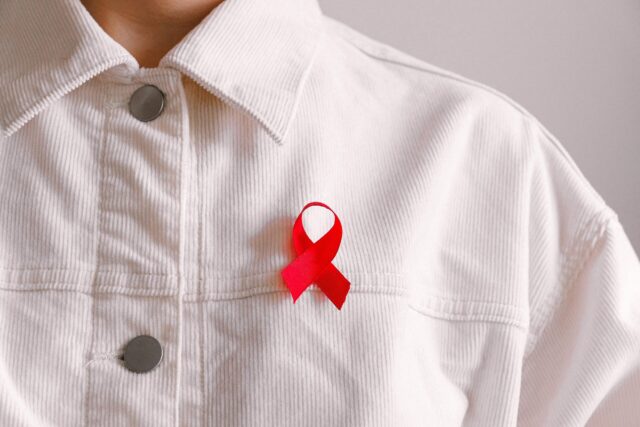In the world of healthy and positive relationships, open communication with your partner, about sexual health, is essential. Were you aware that this week is National HIV Testing Week in England? It’s not just an opportunity to discuss the significance of getting tested, but also a moment to recognise the vital role sexual health plays in each of one of us.
To meet the goal of achieving zero new HIV cases in England by 2030, the Government has outlined a set ambitious targets within HIV action plan. There is still a lot to do, but one of the first steps is to talk openly about it, and educate yourself.
In this article, we aim to raise awareness, tackle the stigma associated with HIV testing by normalising these conversations, and create a more supportive and understanding environment within your relationship, and in society.

5 tips to normalise HIV testing
One of the most beautiful aspects of being in a relationship is the connection, intimacy, and vulnerability that comes with it. Intimacy involves more than shared moments and laughter, it also entails open dialogues about our health and well-being. One vital aspect is discussing the importance of undergoing a full sexual health screening, which includes being tested for HIV and other STIs (Sexual Transmitted Infections).
Beyond being a health check, these conversations foster trust, mutual responsibility, and shared commitment to a positive and healthy relationship.
1. Normalising health discussions
Openly discussing HIV helps normalise conversations about sexual health. Tackle the stigma surrounding HIV contributes to creating a more understanding and supportive environment within the relationship.
Stigma often arises from misinformation, which can lead to a lack of knowledge and understanding about HIV. One of the most common myths about HIV is that it is always fatal. This is not true! Education is key in dispelling such myths.
Important fact: Most people who are living with HIV can live long and healthy lives if they get and stay on treatment.
Undetectable = Untransmittable (U=U). This means that a person living with HIV who is on effective treatment can lower the level of HIV (the viral load) in their blood. When the levels are extremely low, it is referred to as an undetectable viral load. At this stage, HIV cannot be transmitted sexually.

2. Mutual responsibility
Addressing HIV testing is a shared responsibility in any relationship. It demonstrates that you and your partner are committed to safeguarding each other’s health and well-being. It fosters a sense of unity and mutual care.
3. Minimise the risk
Knowledge is power! Discussing HIV testing allows both partners to understand their risk factors, enabling them to make informed decisions about protection methods, whether it’s the use of condoms or other preventive measures.
4. Early detection and treatment
Regular testing can lead to early detection of any potential infections. Early detection is crucial for timely treatment, preventing the development of more severe health issues and reducing the risk of transmission.
5. Respect for each other’s autonomy
Bringing up the topic of HIV testing shows respect for each other’s autonomy and the importance of informed consent. It’s about making joint decisions regarding sexual health, emphasising that both voices matter in the relationship.
Recommendations: If a person is sexually active, changing partners, or engaging in condomless sex with individuals of unknown or unconfirmed HIV status, they should test for HIV and STIs every 3 months. Additionally, individuals starting a new relationship or with symptoms should also undergo testing.

Why to get involved
Knowing your HIV status gives you powerful information to keep you and your partner healthy. The only way to find out is to be tested, as symptoms of HIV may not appear for many years.
Where to get a HIV test
In NHS, HIV testing is quick, confidential and free with multiple available locations. Feel free to choose from some of the following options, based on your preference:
- Sexual Health or Genitourinary medicine (GUM) clinics
- Charities such as Positive East
- Some GP surgeries
- Some contraception and young people’s clinics
You can also be tested from the comfort of your home by ordering an online kit.
- Freetesting.hiv – provide free HIV kit to anyone aged 16+ living in England
- Sexual Health London (SHL) – provide free HIV kit to people aged 16+ living in London
Creating a supportive environment
Encouraging friends, family, and colleagues to get tested for HIV contributes to a supportive environment. When we openly discuss about the importance of testing, we foster a culture where health is prioritise. In addition to that, discussions around HIV become normalised. Consequently, diminishes the stigma associated with testing, making it more likely that individuals will seek it out.
Breaking down stigmas together
Sharing the message about the importance of HIV testing helps break down the persistent stigmas attached to it. Stigmas can act as barriers, preventing individuals from taking proactive steps towards their well-being. We actively participate in dismantling these barriers and create an atmosphere of understanding and acceptance when we encourage others to get tested.
The more individuals who actively do HIV testing, the greater the impact on public health. By forming a collective voice that advocates for regular testing, we contribute to a larger movement that emphasises the significance of sexual health screenings.
Reducing transmission risks
We play a crucial role in reducing the risk of transmission by encouraging others to get tested. As mentioned previously, knowledge is power. When more people are aware of their HIV status, it leads to informed decisions about prevention, thereby minimising the risk of transmission.

Educate yourself and others
A fantastic way to educate yourself and your partner about HIV is by volunteering with a local charity. There is a wide variety of HIV charities in the UK, and it can be a beautiful way for you and your partner to impact lives around you. Through volunteering, you will not only make a tremendous impact in your community but also meet new people and learn new skills 🙂
Related article: Find out where to find volunteering opportunities in London
In our borough, there is an incredible charity called Positive East. Positive East has been at the forefront of HIV service and care for decades, supporting people from point of HIV diagnosis to longer-term care. Feel free to join, or search for another organisation near you.
If you would like to find out more about HIV symptoms, causes, transmission, diagnosis, treatment, and other preventive measures such as PrEP and PEP, check out some links below.
- Terrence Higgins Trust
- Brook – for young adults
- PrEP (Pre-Exposure Prophylaxis) – how effectively a pill called PrEP prevents transmission
- PEP (Post-Exposure Prophylaxis)
- U=U
⭐At Our Love Adventure, we value your opinion! If you have any thoughts, questions, or suggestions about this article, we’d love to hear from you. Feel free to drop us an email, leave a message, and rate below ⭐
Your feedback helps us improve and tailor our content to better serve your interests. Thank you for being a part of our community! See you on the next adventure 🙂




